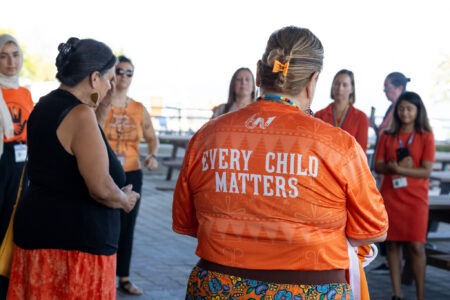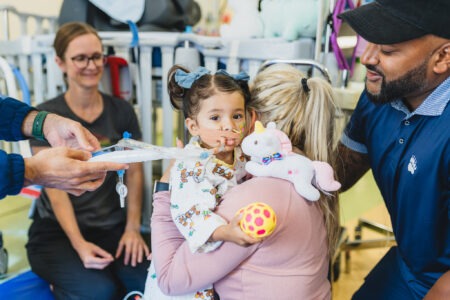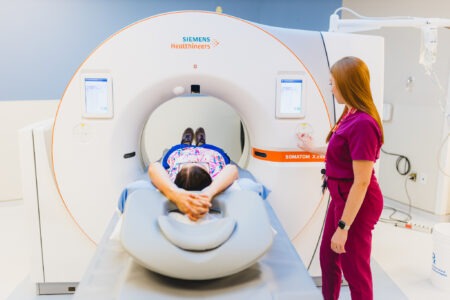PATIENTS
Our patients and their families are at the heart of everything we do. In 2023-24, we focused on making care more safe, equitable, and accessible for the patients we serve. We also invested in programs aimed at the prevention and early detection of health complications and disease, helping patients stay well in their own communities.
Scroll down to read some of the many ways Hamilton Health Sciences teams, enabled by the support and collaboration of the provincial government and community partners, made a positive impact on the health and wellbeing of our patients.
As a hospital, we feel it’s not just our job to respond when people become very sick. Our teams are actively working to support the health of patients before they require hospital care. In 2023-24, they made an impact through a number of initiatives including:
Our hospital’s vision is to provide the Best Care for All. This means ensuring that the care we provide is safe, informed by the best available evidence, and that it aims to ensure patients have the best possible health outcome. There are endless stories to tell about how our teams advanced quality and safety in 2023-24. Here are just a few:
Health equity means striving for equitable access to health care for all people. Guided by our Five-Year Equity, Diversity, and Inclusion Plan, launched in Summer 2023, we’ve made strides in reducing health inequities in our hospital and community. For example:
In 2023-24 we successfully reduced diagnostic, surgical, and procedural wait times across several of our sites and programs. In fact, by the end of the year we were performing nearly as many surgeries as before the COVID-19 pandemic. This means patients get the diagnosis and treatment they need sooner, improving the likelihood of a successful outcome. For example:
Cancer Care Recognition
Two leading-edge HHS cancer care programs were recognized at the 16th annual Quality and Innovation Awards. Both programs focus on having supportive conversations with patients or their children about cancer.
Cancer Coach celebrates 10 years
Our Mobile Cancer Screening Coach, a unique program offering free, mobile cancer screening and smoking cessation support on a 45-foot-long bus, celebrated its 10-year anniversary in 2023. The coach routinely visits over 60 locations across Hamilton, Six Nations of the Grand River, Mississaugas of the Credit First Nation and beyond, increasing access to screening services.
50 years of NICU care
McMaster Children’s Hospital is home to the country’s largest neonatal intensive care unit. In 2023 it celebrated its 50th year of caring for our youngest, most fragile patients.
Supporting patients with pain for 50 years
Our Michael G. DeGroote Pain Clinic at McMaster University Medical Centre celebrated 50 years of supporting patients living with chronic pain. What began in 1973 as one of the first pain clinics in Canada has evolved into the largest academic, university-affiliated pain clinic in the country.
More MRIs, shorter wait times
At McMaster Children’s Hospital a new MRI machine and software has enabled our team to perform MRI imaging on 20 per cent more patients per day, meaning more kids can get the diagnosis and treatment they need sooner.












